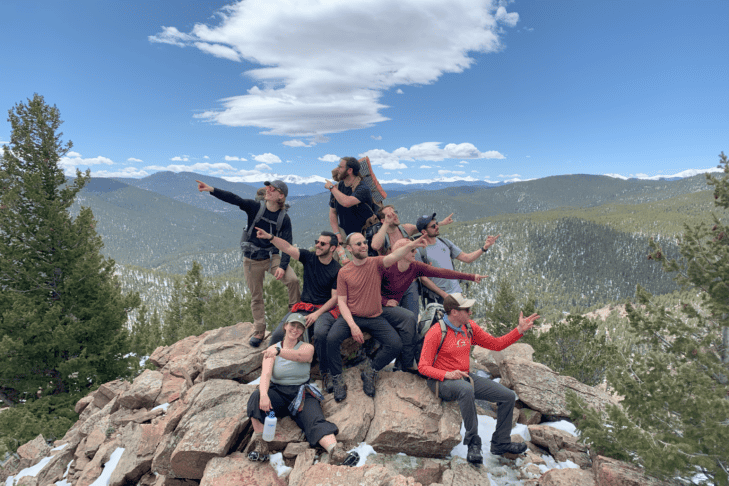The teen mental health crisis has reached a tipping point: During COVID, 44% of teens reported feeling “persistently sad or hopeless,” and 14% say they’ve contemplated suicide.
BaMidbar offers a unique, Jewish way to support teens—and adults—in times of crisis, with adventure-based therapy for youth and mental health training for Jewish professionals.
The group launched in Denver in 2016 as a residential program. Today, BaMidbar offers non-residential individual and group therapy, often outdoors, community education and Jewish professional development right here in Boston, where it also partners with prominent Jewish organizations like CJP, including its Jewish Teen Initiative (BaMidbar facilitates the Peer Wellness cohort of JTI’s flagship Peer Leadership Fellows program). BaMidbar’s Boston-based therapy programs are generously supported by the Ruderman Family Foundation.
BaMidbar is a clearly valuable resource: From 2020-2022, the organization saw a 440% increase in programming. As of this month, its therapy services accept insurance (always helpful!).
“We pretty quickly realized that we were having a deep impact on a small number of people, but the need in the Jewish community is so vast. We believe that community is really central to supporting mental health. By doing this work in an isolated setting, we felt like we were missing a really key opportunity to leverage this strength of community,” CEO Jory Hanselman Mayschak says of the organization’s residential roots. “We really envision a Jewish community that actively supports young people in cultivating mental health and wellness.”
BaMidbar—which translates to “in the wilderness”—is rooted in the Jewish camping movement, founded on the power of experiential education and the belief that Jewish tradition provides chances for growth and self-discovery. The treatment philosophy is based around four key Jewish tenets: Shlemut: recognizing the multi-dimensional nature of whole-health wellness; Simcha: finding joyful Jewish meaning in every aspect of our lives; Kehillah: embracing the power of a supportive and inclusive community; and Tzmicha i’shit: accepting the challenges of personal transformation.
Teens and young adults 13 to 28 can seek therapy at its offices inside Newton’s JCC Greater Boston, but often, treatment isn’t office-based, since that one-to-one clinical dynamic can be awkward for younger people. Instead, clinicians take clients outside for a walk, kayaking on the Charles River or maybe to a rock-wall climbing at a local gym.
“Instead of talking about, ‘What does your anxiety feel like?’ clients will get on a climbing wall and learn to regulate their breathing and engage in positive self-talk through an activity that might mimic, physiologically, some of the challenges students face when they’re feeling upset. They practice coping skills in that safe, supported environment,” Hanselman Mayschak explains.
In addition, with funding from CJP, BaMidbar partners with Gateways on Developing Minds, an initiative that helps organizational leaders and youth-serving organizations add mental health to their infrastructure. Its first cohort will be wrapping up this winter. The organization also trains Jewish engagement professionals on youth mental health first aid. (Find those CJP-supported opportunities here.)
BaMidbar also offers fellowships for peer leaders in the mental health space, partnering with camps, Hillels and synagogues. It provides a wellness-based and resilience-focused curriculum through backpacking and camping trips, coupled with Jewish learning and mental health education. Finally, it works closely with teen-facing professionals, including at CJP, on essential topics such as self-care, boundaries and burnout.
“We train and support professionals in thinking about their own mental health, and then we help them think about how they can be advocates to destigmatize mental health. So, it’s really focusing on this idea of communication, mental health awareness, advocacy and de-stigmatization—training teams to be able to play a leadership role within the community,” Hanselman Mayschak says.
Through it all, Jewish values are essential, she says.
“We have 3,000 years of tradition that speaks to the question: What does it mean to live well? Does it mean to face adversity? How do we keep persevering when we face challenges? How do we lean into Jewish community spaces, to build community to combat loneliness, to find support systems and to strengthen an ecosystem around us that helps us move through challenges?”
To learn more, visit bamidbartherapy.org.



